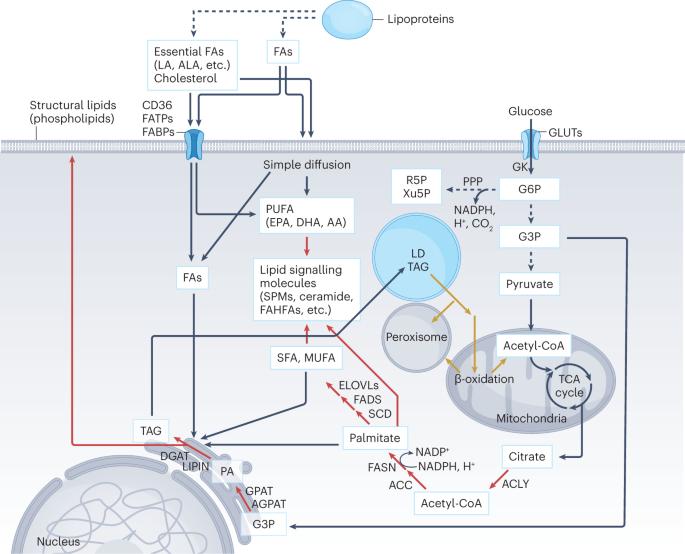Physiological and pathological roles of lipogenesis
IF 20.8
1区 医学
Q1 ENDOCRINOLOGY & METABOLISM
引用次数: 5
Abstract
Lipids are essential metabolites, which function as energy sources, structural components and signalling mediators. Most cells are able to convert carbohydrates into fatty acids, which are often converted into neutral lipids for storage in the form of lipid droplets. Accumulating evidence suggests that lipogenesis plays a crucial role not only in metabolic tissues for systemic energy homoeostasis but also in immune and nervous systems for their proliferation, differentiation and even pathophysiological roles. Thus, excessive or insufficient lipogenesis is closely associated with aberrations in lipid homoeostasis, potentially leading to pathological consequences, such as dyslipidaemia, diabetes, fatty liver, autoimmune diseases, neurodegenerative diseases and cancers. For systemic energy homoeostasis, multiple enzymes involved in lipogenesis are tightly controlled by transcriptional and post-translational modifications. In this Review, we discuss recent findings regarding the regulatory mechanisms, physiological roles and pathological importance of lipogenesis in multiple tissues such as adipose tissue and the liver, as well as the immune and nervous systems. Furthermore, we briefly introduce the therapeutic implications of lipogenesis modulation. Kim and colleagues discuss the regulatory mechanisms of lipogenesis, the physiological and pathological role of lipogenesis in tissues such as adipose tissue, liver, neurons and cancer, and how lipogenesis may be targeted therapeutically to ameliorate disease.

脂肪生成的生理和病理作用
脂质是人体必需的代谢物,具有能量来源、结构成分和信号介质的功能。大多数细胞能够将碳水化合物转化为脂肪酸,脂肪酸通常转化为中性脂质,以脂滴形式储存。越来越多的证据表明,脂肪生成不仅在代谢组织的系统能量平衡中发挥着关键作用,而且在免疫和神经系统的增殖、分化甚至病理生理作用中也发挥着关键作用。因此,脂肪生成过多或不足与脂质平衡失调密切相关,可能导致血脂异常、糖尿病、脂肪肝、自身免疫性疾病、神经退行性疾病和癌症等病理后果。为了实现全身能量平衡,参与脂肪生成的多种酶受到转录和翻译后修饰的严格控制。在本综述中,我们将讨论有关脂肪生成在脂肪组织和肝脏等多种组织以及免疫和神经系统中的调控机制、生理作用和病理重要性的最新发现。此外,我们还简要介绍了调节脂肪生成的治疗意义。Kim 及其同事讨论了脂肪生成的调控机制,脂肪生成在脂肪组织、肝脏、神经元和癌症等组织中的生理和病理作用,以及如何针对脂肪生成进行治疗以改善疾病。
本文章由计算机程序翻译,如有差异,请以英文原文为准。
求助全文
约1分钟内获得全文
求助全文
来源期刊

Nature metabolism
ENDOCRINOLOGY & METABOLISM-
CiteScore
27.50
自引率
2.40%
发文量
170
期刊介绍:
Nature Metabolism is a peer-reviewed scientific journal that covers a broad range of topics in metabolism research. It aims to advance the understanding of metabolic and homeostatic processes at a cellular and physiological level. The journal publishes research from various fields, including fundamental cell biology, basic biomedical and translational research, and integrative physiology. It focuses on how cellular metabolism affects cellular function, the physiology and homeostasis of organs and tissues, and the regulation of organismal energy homeostasis. It also investigates the molecular pathophysiology of metabolic diseases such as diabetes and obesity, as well as their treatment. Nature Metabolism follows the standards of other Nature-branded journals, with a dedicated team of professional editors, rigorous peer-review process, high standards of copy-editing and production, swift publication, and editorial independence. The journal has a high impact factor, has a certain influence in the international area, and is deeply concerned and cited by the majority of scholars.
 求助内容:
求助内容: 应助结果提醒方式:
应助结果提醒方式:


